#1961 Baleares
Explore tagged Tumblr posts
Text

Beautiful Tina Aumont pictured in 1961 when she was 15 years old.
Baleares, 18th April 1961.
Biblioteca Virtual de Prensa Histórica.
11 notes
·
View notes
Text

Princess Grace and Prince Rainier as they arrive at Hotel Formentor, in Majorca (Spain), on July 3, 1961 for a holiday.
4 notes
·
View notes
Text

House (1961) on the Balearic island of Ibiza, Spain, by Jose Luis Sert
150 notes
·
View notes
Text

Palma de Mallorca 3rd-7-1961.- A gala dinner is being held in the gardens of the Son Vida hotel in honour of the princes of Monaco, who are visiting the island. In the picture, Princess Grace with the civil governor of the Balearic Islands, Plácido Alvarez Buylla.
2 notes
·
View notes
Text
También fue el sexto más cálido desde el comienzo de la serie en 1961. El bimestre julio-agosto solo fue superado en temperaturas por el de 2022 En su transcurso se produjeron dos olas de calor. Una de ellas tuvo una duración de 21 días, la segunda más larga desde que hay registros Fue un verano muy húmedo, con chubascos frecuentes en junio y un importante temporal de lluvias en Baleares en agosto Lo más probable es que el otoño astronómico sea cálido en todo el país y más seco de lo normal en el oeste peninsular y Canarias La Agencia Estatal de Meteorología (AEMET), dependiente del Ministerio para la Transición Ecológica y el Reto Demográfico (MITECO), ha publicado el resumen climático del verano de 2024. Tuvo un carácter muy cálido y se trató del sexto verano más cálido del siglo actual y de la serie histórica. Fue también un verano muy húmedo: el sexto más lluvioso del siglo XXI. TEMPERATURAS En la España peninsular, la temperatura media del verano (periodo comprendido entre el 1 de junio y el 31 de agosto de 2024) fue de 23,1 °C, valor que queda 1,0 °C por encima de la media de esta estación (periodo de referencia 1991-2020). Fue el sexto verano más cálido desde el comienzo de la serie en 1961, y también el sexto más cálido del siglo XXI. De los diez veranos más cálidos de la serie, nueve pertenecen al siglo XXI. El verano tuvo carácter muy cálido en la mayor parte de la España peninsular e incluso extremadamente cálido en zonas del interior. En Baleares fue cálido o muy cálido, mientras que en Canarias tuvo carácter variable, resultando en conjunto cálido. A pesar de que el verano comenzó con un junio frío, julio fue muy cálido y agosto extremadamente cálido. De hecho, el bimestre julio-agosto fue el segundo con mayor temperatura de la serie, tan solo superado por el de 2022. Serie de anomalías de la temperatura media del verano en la España peninsular desde 1961 a 2024, tomando el período de referencia 1991-2020 Con datos aún provisionales, a lo largo del verano se registraron dos olas de calor. La primera transcurrió entre el 18 y 20 de julio, y llegó a afectar a 11 provincias. Más importante fue la ola de calor registrada entre el 23 de julio y el 12 de agosto. Llegó a afectar a 31 provincias en su momento de mayor extensión y, con 21 días de duración, se convirtió en la segunda ola de calor más larga en España de la serie histórica, tan solo por detrás de la ola de 26 días de duración registrada entre junio y julio de 2015. Más allá del verano, hay que señalar que el año 2024, con los datos desde el 1 de enero hasta el 15 de septiembre, es por ahora el segundo más cálido de la serie histórica, tan sólo por detrás del año 2022. Considerando ese período, los cinco años más cálidos de la serie, cuyo comienzo data de 1961, se han registrado desde 2017. PRECIPITACIONES El verano fue en su conjunto muy húmedo en cuanto a precipitaciones, con un valor de precipitación media sobre la España peninsular de 82,2 mm, valor que representa el 117 % del normal en el periodo de referencia 1991-2020. Se trató del sexto verano más lluvioso del siglo XXI y vigésimo tercero de la serie. La distribución de las precipitaciones fue irregular tanto temporal como espacialmente: junio fue muy húmedo, julio muy seco y agosto húmedo. Fue un verano muy lluvioso en zonas del centro de la Península e interior del Levante, mientras que en Galicia, Andalucía y Canarias fue muy seco. Hubo varios episodios de precipitaciones intensas en junio, como el que el día 11 dejó 80 mm en el aeropuerto de Palma, el registro más elevado en 24 horas en verano de toda la serie. También en Baleares, un episodio asociado a una DANA dejó precipitaciones muy intensas a mediados de agosto: el día 15 se acumularon en el aeropuerto de Menorca 93 mm, récord en 24 horas para el verano en este observatorio. Porcentaje de las precipitaciones respecto al promedio normal del período 1991-2020 durante el verano de 2024. PREDICCIÓN ESTAC...

View On WordPress
2 notes
·
View notes
Text
Tramuntana Lighthouse
Mallorca, Balearic Islands, Spain
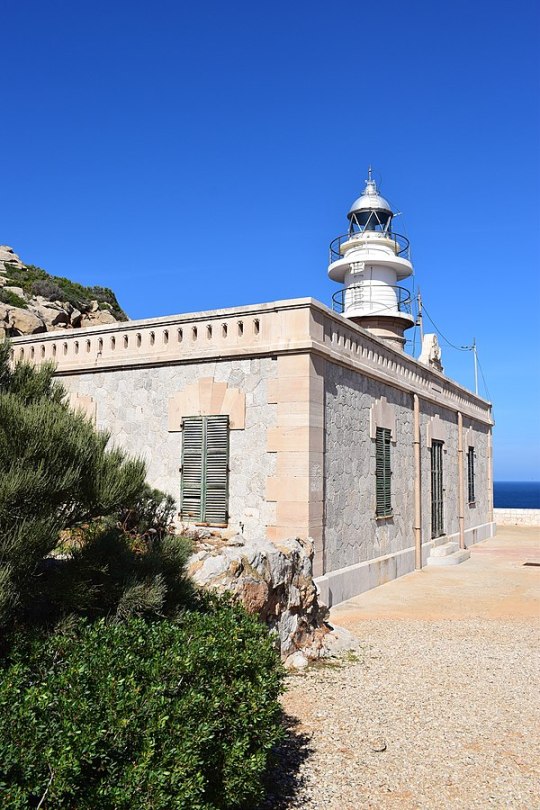
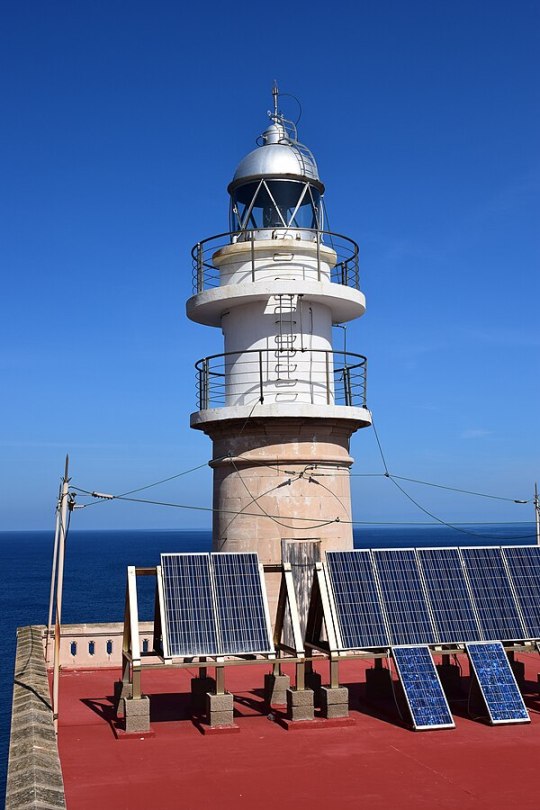
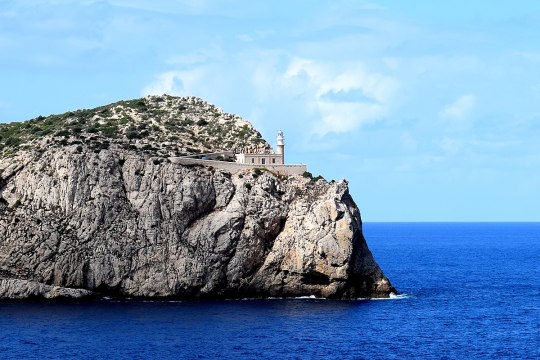
Source: Wikimedia Commons | Wikimedia Commons | Wikimedia Commons
Constructed: 1910
Decommissioned: 1961
Have a favorite lighthouse? Curious about lighthouses in general? Send an ask!
5 notes
·
View notes
Text
Efectos de la sequía en Ibiza y Formentera (Islas Baleares, España)
Estas imágenes de satélite de la Agencia Espacial Europea muestran efectos de la sequía en las islas de Ibiza y Formentera (Baleares, España). La sequía que están viviendo estas islas recuerda a una muy dura que hubo en el año 1961. Está afectado gravemente a la agricultura, las reservas de agua y el ecosistema en general. Los patrones erráticos de lluvia y la creciente demanda de agua en las…

View On WordPress
0 notes
Photo

Droughts in mainland Spain and the Balearic Islands between 1961-2020.
by @dr_xeo
72 notes
·
View notes
Photo
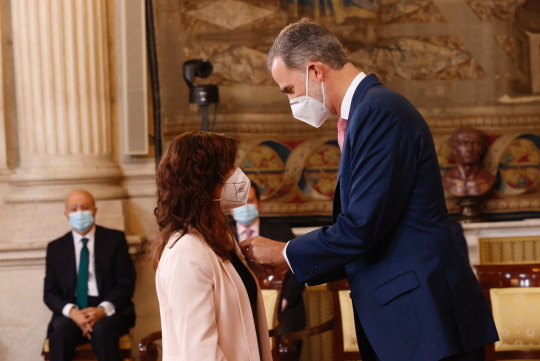
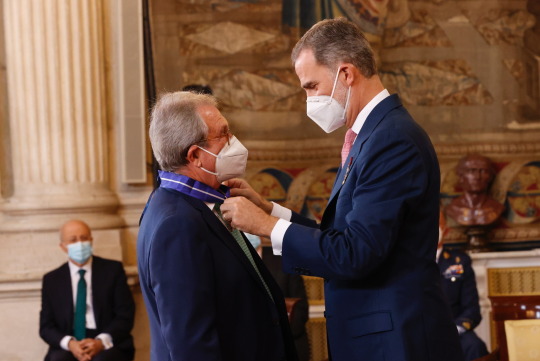
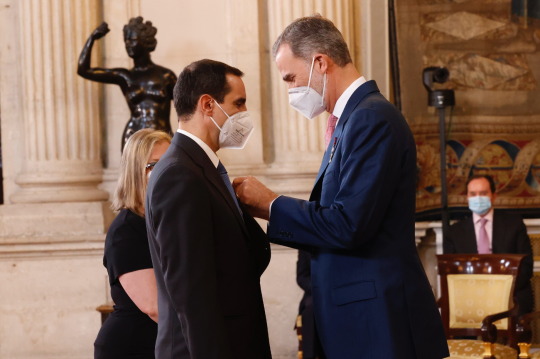
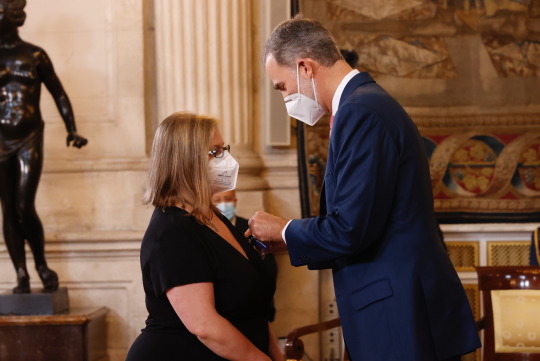
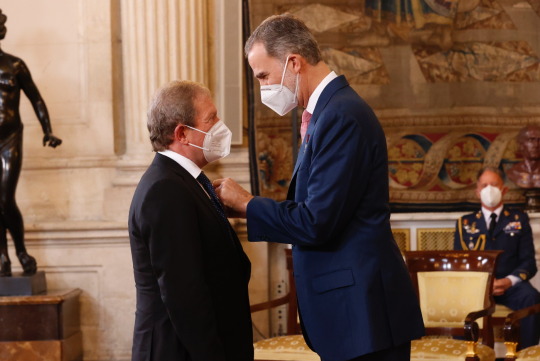

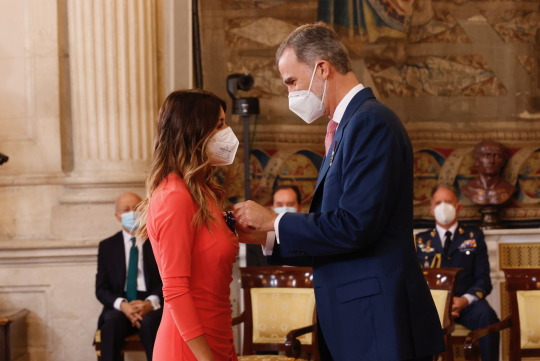
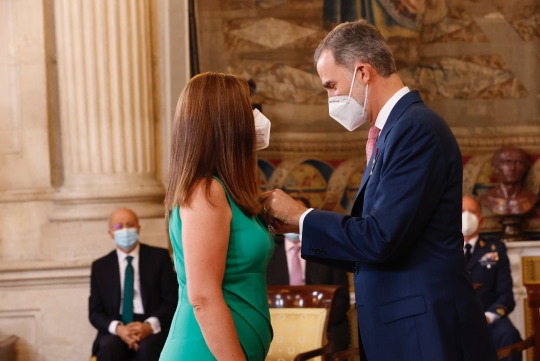

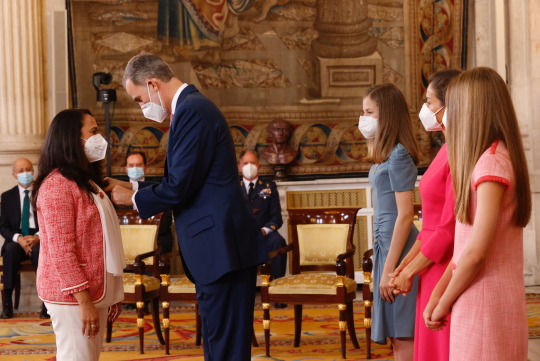
June 18, 2021: King Felipe, Queen Letizia, Princess Leonor and Infanta Sofia attended an event of delivery of the Order of Civil Merit Condecorations to mark the 7th anniversary of King Felipe’s proclamation.
On the occasion of the seventh anniversary of the Proclamation of His Majesty the King, as on previous occasions -2015 and 2019- it is a matter of expressing the recognition of the Crown to those who carry out their life and ordinary professional work in an exemplary way, at the service of society.
On this occasion, in a very special way, for their contribution during the challenge of Covid-19, we recognize citizens for their example of personal commitment and social contribution.
The selection, with criteria of representation and territorial and sectoral balance, is the result of the Crown’s contact with society and has been carried out with the institutional contribution of all the administrations and also of many other entities, organizations, associations and representative groups in different fields, labor, economic, social, educational and cultural. Those who have been recognized with the Medal of the Order of Civil Merit are a reflection of the situation experienced by millions of people in the time marked by the pandemic and its consequences.
The 17 Autonomous Communities and the two Autonomous Cities are represented, with twice the representation, the Communities with a population of more than 5 million (Andalusia, Catalonia, Valencian Community and Madrid). There are 16 women and 8 men aged between 30 and 74 years old.
The professions represented have to do with different sectors: Health, Research, Agriculture, Livestock, Fishing, Hospitality, Commerce, Transport, Logistics, Services, Volunteering, Education and Culture. During the most acute phase of the pandemic and confinement, all these sectors showed the fundamental role they play every day in the lives of citizens. There are five fundamental groups of awarded: those linked to the rural world and the primary sector, those related to knowledge management (education, culture and science), those linked to volunteering and the third sector, health workers and, finally, some of the professions that were shown, in addition to health workers, as essential during the confinement of the pandemic.
During the event, Their Majesties the King and Queen, HRH the Princess of Asturias and HRH the Infanta Doña Sofía were accompanied by the Minister of Foreign Affairs, European Union and Cooperation and Grand Chancellor of the Order of Civil Merit, Arancha González Spade; the Undersecretary of Foreign Affairs, European Union and Cooperation and Chancellor of the Order of Civil Merit, María Celsa Nuño; and by the general director of Protocol, Chancellery and Orders and secretary of the Order of Civil Merit, Caridad Batalla.
Elena Ochoa, who acted as master of ceremony, read the biographies of the citizens who received the decorations of the Order of Civil Merit, which were:
- Don David Lafuente Rico (1982), farmer from La Rioja. - Doña Noelia Aparicio Martínez (1972), rancher from La Milla del Río (Castilla y León). - Don Manuel Vinatea Fernández (1961), Sailor from Santoña (Cantabria). - Doña Cristina Crespo Miñana (1973), materials researcher from Zaragoza (Aragon). - Doña María del Mar Delgado Serrano (1967), researcher from Córdoba (Andalusia). - Don Esteban Orenes Piñero (1978), biosanitary researcher from Murcia. - Doña Cristina García Sánchez (1978), early childhood education teacher from Ceuta. - Doña Natividad Baldominos Baldominos (1967), solidarity singer from Guadalajara (Castilla-La Mancha). - Doña Carmen Martínez Valladares (1951), volunteer on the phone. of the hope of Silleda, Pontevedra (Galicia). - Doña Margalida Jordà Murnar (1947), director of the educational project Naüm de Sineu, Mallorca (Balearic Islands). - Don Miguel Herrera (1987), solidarity cook from Algodonales, Cádiz (Andalusia). - Doña Silvia Cano Moreno (1970), doctor from Melilla. - Don Fernando Gómez Gil (1980), nurse from Pamplona (Navarra). - Doña Alice Mihaela Cozma (1988), ambulance driver from Extremadura. - Doña Nuria Cascales Picó (1990), Pharmaceutical from Torremanzanas, Alicante (Valencian Community). - Don Antonio Roldán Bonilla (1947), Mercamadrid worker in the Community of Madrid. - Doña Cristina Díaz López (1976) and Don Sergio Mediavilla Cuesta (1974), owners of a grocery store and n the Community of Madrid. - Mrs. Virginia Marquinez Insagurbe (1984), director of the Vitoria-Gasteiz post office (Basque Country). - Don Albert Esteve Robles (1986), transporter from Lleida (Catalonia). - Doña Yukonda Esparragoza Jiménez (1971), manager of a laundry in Gran Canaria (Canary Islands). - Don Luis Alberto Ramos Fernández (1960), waste treatment worker in Oviedo (Principality of Asturias). - Doña Marta Muñoz Escrivá (1991), hospitality assistant in Valencia (Valencian Community). - Doña Elena García Solís (1979), supermarket cashier in Badalona (Catalonia).
At the end of the act in the Hall of Columns, the King and Queen, the Princess of Asturias and the Infanta Doña Sofía, went to the Hall of Halberdiers, where a group photograph with the decorated ones took place. Later, they held a meeting with the winning children of the school contest “What is a King for you?”
The Order of Civil Merit was instituted by King Alfonso XIII, by Royal Decree of June 25, 1926, to reward “the civic virtues of officials at the service of the State, as well as the extraordinary services of Spanish and foreign citizens in the good of the Nation ”.
The preamble to the order states that “its purpose is to reward merits of a civil nature, acquired by personnel dependent on any of the public Administrations” or “by persons outside the Administration, who render or have rendered relevant services to the State. , with extraordinary work, profitable initiatives, or with exemplary constancy in the fulfillment of their duties. This decoration may also be awarded to persons of foreign nationality, provided they have rendered distinguished services to Spain or a notable collaboration in all matters that benefit the Nation. His Majesty the King is the Grand Master of the Order of Civil Merit. All the decorations of this order will be conferred in his name and the corresponding titles will be authorized with the stamp of his signature.
#King Felipe#Queen Letizia#Princess Leonor#Infanta Sofia#King Felipe of Spain#Queen Letizia of Spain#Princess Leonor of Asturias#Infanta Sofia of Spain#King Felipe VI#Princess of Asturias#King Felipe VI of Spain#Official Event#20210618#June 2021
38 notes
·
View notes
Text
Events 5.21
293 – Roman Emperors Diocletian and Maximian appoint Galerius as Caesar to Diocletian, beginning the period of four rulers known as the Tetrarchy. 878 – Syracuse, Sicily, is captured by the Muslim Aghlabids after a nine-month siege. 879 – Pope John VIII gives blessings to Branimir of Croatia and to the Croatian people, considered to be international recognition of the Croatian state. 996 – Sixteen-year-old Otto III is crowned Holy Roman Emperor. 1349 – Dušan's Code, the constitution of the Serbian Empire, is enacted by Dušan the Mighty. 1403 – Henry III of Castile sends Ruy González de Clavijo as ambassador to Timur to discuss the possibility of an alliance between Timur and Castile against the Ottoman Empire. 1554 – Queen Mary I grants a royal charter to Derby School, as a grammar school for boys in Derby, England. 1659 – In the Concert of The Hague, the Dutch Republic, the Commonwealth of England and the Kingdom of France set out their views on how the Second Northern War should end. 1660 – The Battle of Long Sault concludes after five days in which French colonial militia, with their Huron and Algonquin allies, are defeated by the Iroquois Confederacy. 1674 – The nobility elect John Sobieski King of Poland and Grand Duke of Lithuania. 1703 – Daniel Defoe is imprisoned on charges of seditious libel. 1725 – The Order of St. Alexander Nevsky is instituted in Russia by Empress Catherine I. It would later be discontinued and then reinstated by the Soviet government in 1942 as the Order of Alexander Nevsky. 1758 – Ten-year-old Mary Campbell is abducted in Pennsylvania by Lenape during the French and Indian War. She is returned six and a half years later. 1792 – A lava dome collapses on Mount Unzen, near the city of Shimbara on the Japanese island of Kyūshū, creating a deadly tsunami that killed nearly 15,000 people. 1809 – The first day of the Battle of Aspern-Essling between the Austrian army led by Archduke Charles and the French army led by Napoleon I of France sees the French attack across the Danube held. 1851 – Slavery in Colombia is abolished. 1856 – Lawrence, Kansas is captured and burned by pro-slavery forces. 1863 – American Civil War: The Union Army succeeds in closing off the last escape route from Port Hudson, Louisiana, in preparation for the coming siege. 1864 – Russia declares an end to the Russo-Circassian War and many Circassians are forced into exile. The day is designated the Circassian Day of Mourning. 1864 – American Civil War: The Battle of Spotsylvania Court House ends. 1864 – The Ionian Islands reunite with Greece. 1871 – French troops invade the Paris Commune and engage its residents in street fighting. By the close of "Bloody Week", some 20,000 communards have been killed and 38,000 arrested. 1871 – Opening of the first rack railway in Europe, the Rigi Bahnen on Mount Rigi. 1879 – War of the Pacific: Two Chilean ships blocking the harbor of Iquique (then belonging to Peru) battle two Peruvian vessels in the Battle of Iquique. 1881 – The American Red Cross is established by Clara Barton in Washington, D.C. 1894 – The Manchester Ship Canal in the United Kingdom is officially opened by Queen Victoria, who later knights its designer Sir Edward Leader Williams. 1904 – The Fédération Internationale de Football Association (FIFA) is founded in Paris. 1911 – President of Mexico Porfirio Díaz and the revolutionary Francisco Madero sign the Treaty of Ciudad Juárez to put an end to the fighting between the forces of both men, concluding the initial phase of the Mexican Revolution. 1917 – The Imperial War Graves Commission is established through royal charter to mark, record, and maintain the graves and places of commemoration of the British Empire's military forces. 1917 – The Great Atlanta fire of 1917 causes $5.5 million in damages, destroying some 300 acres including 2,000 homes, businesses and churches, displacing about 10,000 people but leading to only one fatality (due to heart attack). 1924 – University of Chicago students Richard Loeb and Nathan Leopold, Jr. murder 14-year-old Bobby Franks in a "thrill killing". 1927 – Charles Lindbergh touches down at Le Bourget Field in Paris, completing the world's first solo nonstop flight across the Atlantic Ocean. 1932 – Bad weather forces Amelia Earhart to land in a pasture in Derry, Northern Ireland, and she thereby becomes the first woman to fly solo across the Atlantic Ocean. 1934 – Oskaloosa, Iowa, becomes the first municipality in the United States to fingerprint all of its citizens. 1936 – Sada Abe is arrested after wandering the streets of Tokyo for days with her dead lover's severed genitals in her handbag. Her story soon becomes one of Japan's most notorious scandals. 1937 – A Soviet station, North Pole-1, becomes the first scientific research settlement to operate on the drift ice of the Arctic Ocean. 1939 – The Canadian National War Memorial is unveiled by King George VI and Queen Elizabeth in Ottawa, Ontario, Canada. 1946 – Physicist Louis Slotin is fatally irradiated in a criticality incident during an experiment with the demon core at Los Alamos National Laboratory. 1951 – The opening of the Ninth Street Show, otherwise known as the 9th Street Art Exhibition: A gathering of a number of notable artists, and the stepping-out of the post war New York avant-garde, collectively known as the New York School. 1961 – American civil rights movement: Alabama Governor John Malcolm Patterson declares martial law in an attempt to restore order after race riots break out. 1966 – The Ulster Volunteer Force declares war on the Irish Republican Army in Northern Ireland. 1969 – Civil unrest in Rosario, Argentina, known as Rosariazo, following the death of a 15-year-old student. 1972 – Michelangelo's Pietà in St. Peter's Basilica in Rome is damaged by a vandal, the mentally disturbed Hungarian geologist Laszlo Toth. 1976 – Twenty-nine people are killed in the Yuba City bus disaster in Martinez, California. 1979 – White Night riots in San Francisco following the manslaughter conviction of Dan White for the assassinations of George Moscone and Harvey Milk. 1981 – The Italian government releases the membership list of Propaganda Due, an illegal pseudo-Masonic lodge that was implicated in numerous Italian crimes and mysteries. 1981 – Transamerica Corporation agrees to sell United Artists to Metro-Goldwyn-Mayer for $380 million after the box office failure of the 1980 film Heaven's Gate. 1982 – Falklands War: A British amphibious assault during Operation Sutton leads to the Battle of San Carlos. 1991 – Former Indian Prime Minister Rajiv Gandhi is assassinated by a female suicide bomber near Madras. 1991 – Mengistu Haile Mariam, president of the People's Democratic Republic of Ethiopia, flees Ethiopia, effectively bringing the Ethiopian Civil War to an end. 1992 – After 30 seasons Johnny Carson hosted his penultimate episode and last featuring guests (Robin Williams and Bette Midler) of The Tonight Show. 1994 – The Democratic Republic of Yemen unsuccessfully attempts to secede from the Republic of Yemen; a war breaks out. 1996 – The ferry MV Bukoba sinks in Tanzanian waters on Lake Victoria, killing nearly 1,000. 1998 – In Miami, five abortion clinics are attacked by a butyric acid attacker. 1998 – President Suharto of Indonesia resigns following the killing of students from Trisakti University earlier that week by security forces and growing mass protests in Jakarta against his ongoing corrupt rule. 2001 – French Taubira law is enacted, officially recognizing the Atlantic slave trade and slavery as crimes against humanity. 2003 – The 6.8 Mw Boumerdès earthquake shakes northern Algeria with a maximum Mercalli intensity of X (Extreme). More than 2,200 people were killed and a moderate tsunami sank boats at the Balearic Islands. 2005 – The tallest roller coaster in the world, Kingda Ka opens at Six Flags Great Adventure in Jackson Township, New Jersey. 2006 – The Republic of Montenegro holds a referendum proposing independence from the State Union of Serbia and Montenegro; 55% of Montenegrins vote for independence. 2010 – JAXA, the Japan Aerospace Exploration Agency, launches the solar-sail spacecraft IKAROS aboard an H-IIA rocket. The vessel would make a Venus flyby late in the year. 2011 – Radio broadcaster Harold Camping predicted that the world would end on this date. 2012 – A bus accident near Himara, Albania kills 13 people and injures 21 others. 2012 – A suicide bombing kills more than 120 people in Sana'a, Yemen. 2017 – Ringling Bros. and Barnum & Bailey Circus performed their final show at Nassau Veterans Memorial Coliseum.
4 notes
·
View notes
Text
Junio de 2022, otro mes lejos de las medias - Agencia Estatal de Meteorología
Junio de 2022, otro mes lejos de las medias – Agencia Estatal de Meteorología
06/07/2022 – El mes pasado fue muy caluroso: el cuarto junio más caluroso desde el inicio de la serie en 1961. La ola de calor registrada entre el 11 y el 18 del mes en la península y Baleares es la que se ha producido El El más temprano de la serie, igualando los récords del 11 de junio de 1981. También ha sido muy seco: el quinto más seco del siglo y el octavo desde que comenzó la serie en…
View On WordPress
0 notes
Photo

Princess Grace of Monaco at a dinner at Hotel Formentor in Majorca, Balearic Islands, Spain, in 1961.
#GRACE KELLY#princess grace#grace de monaco#hotel formentor#majorca#balearic islands#spain#1961#1960s#princesse grace#gracia de monaco#fürstin gracia#mallorca#baleares#españa#onassis#cartier#pearls
19 notes
·
View notes
Text
February was the third warmest month of the century in the Archipelago
February was the third warmest month of the century in the Archipelago
Last February was the second driest month of this century, after the one recorded in 2020, and the third since the series began in 1961, with an average rainfall of 10.9 liters per square meter, 21% of the normal value. of the month. This is reflected in the monthly climate balance of the State Meteorological Agency (Aemet), which indicates that it was “extremely dry” in the Balearic Islands,…

View On WordPress
0 notes
Text

Palma de Mallorca, Balearic Islands - July 3, 1961: Princess Grace of Monaco attend a bullfight in the Balearic capital.
16 notes
·
View notes
Text
Balance climático de AEMET Los tres últimos años han sido los más cálidos y los diez con mayor temperatura media desde 1961 se han registrado en el siglo XXI Enero, agosto y noviembre fueron los más cálidos. Se produjeron tres olas de calor, con una duración total de 22 días, es decir, una de cada cuatro jornadas del verano. No hubo ninguna ola de frío Aunque en conjunto fue un año húmedo, en el sureste peninsular tuvo un carácter seco, al igual que en Canarias, donde 2024 fue el año menos lluvioso de toda la serie histórica La Agencia Estatal de Meteorología (AEMET), dependiente del Ministerio para la Transición Ecológica y el Reto Demográfico (MITECO), ha publicado un avance de las principales características climáticas de 2024 en España. Fue un año extremadamente cálido y también húmedo, aunque con diferencias regionales en cuanto a las precipitaciones. TEMPERATURAS El año 2024 fue extremadamente cálido, con una temperatura media sobre la España peninsular de 15,0 °C, valor que queda 1,1 °C por encima de la media anual (periodo de referencia 1991-2020). Fue el tercer año más cálido desde el comienzo de la serie en 1961, por detrás de 2022 y 2023. Los diez años más cálidos de la serie pertenecen al siglo XXI. Tabla de temperaturas medias en 2024 en los distintos ámbitos geográficos de España, anomalía con respecto a lo normal y carácter. Serie de anomalías de la temperatura media anual en la España peninsular desde 1961 (Periodo de referencia 1991-2020) El año fue extremadamente cálido en la mayor parte del este, centro y sur de la España peninsular, mientras que resultó muy cálido en las regiones cantábricas y en el tercio oeste peninsular. En ambos archipiélagos fue también extremadamente cálido. En 2024 fueron frecuentes los episodios de temperaturas más altas de lo normal. Tres meses fueron los más cálidos desde que hay registros: enero, agosto y noviembre. El invierno, que incluye diciembre de 2023, también fue el más cálido de la serie, empatado con el de 2019-2020. La primavera fue cálida y tanto el verano como el otoño fueron muy cálidos. Se registraron, en verano, tres olas de calor en el ámbito de la Península y Baleares, con un total de 22 jornadas bajo esa situación, es decir, una de cada cuatro del total del verano. Las olas de calor transcurrieron entre el 18 y 20 de julio, entre el 23 de julio y 1 de agosto y entre el 4 y 12 de agosto. Entre las estaciones de la red principal, destacan las temperaturas máximas 43,5 ºC en Morón de la Frontera y 43,3 ºC en Badajoz, ambas registradas el 24 de julio. En cuanto a bajas temperaturas, aunque hubo varios episodios con temperaturas inferiores a las normales, no hubo ninguna ola de frío. El período más prolongado con valores más fríos de lo normal tuvo lugar entre el 23 de febrero y 11 de marzo, sobre todo por valores diurnos bajos. Las temperaturas más bajas en las estaciones de la red principal fueron los -9,2 ºC de Soria el 21 de enero y los -8,7 ºC de Molina de Aragón el 30 de diciembre. PRECIPITACIONES El año 2024 fue, en su conjunto, húmedo en cuanto a precipitaciones, con un valor sobre España peninsular de 669,1 mm, que representa el 105 % del valor normal en el periodo de referencia 1991-2020. Se ha tratado del vigésimo sexto año más húmedo desde el comienzo de la serie en 1961, y el décimo del siglo XXI. En Canarias ha sido el año más seco de la serie desde 1961, con una precipitación total de 138,8 mm. Tabla de precipitaciones medias en 2024 en los distintos ámbitos geográficos de España, anomalía con respecto a lo normal y carácter. La precipitación acumulada en el año 2024 fue superior al valor normal en prácticamente toda la Península y Baleares, llegando a duplicarse en puntos de la provincia de Valencia, debido en este caso en buena parte a la precipitación recogida el día 29 de octubre. Por otra parte, la precipitación acumulada fue inferior al 75 % de lo normal en zonas del sureste peninsular (sobre todo en las prov...

View On WordPress
0 notes
Photo

CHARACTER STUDY 007 → MCKINNON TIMELINE.
1921. an ambitious and bold archibald mckinnon opens the first erised towers hotel in edinburgh, scotland at 24 years old.
1932. brochan mckinnon is born as the only child to archibald and heather mckinnon.
1952. twenty years later, brochan becomes the next head of the company, with big plans to expand and improve upon his father’s company.
1957. after five years, the mckinnon men open the second hotel in london. this is where they really pick up momentum, with cities approaching them about building the next resort in their city. brochan also marries alisa fawley this year.
1960. their belfast location opens for business.
1961. after four years of struggling to get pregnant, alisa finally gives birth to a beautiful baby boy, victor mckinnon.
1965. marlene’s uncle, gavin mckinnon, is born.
1980. victor marries young --- at 19, his wedding is highly publicized. not because of the mckinnons, though, but the woman he’s marrying. astoria nott ties the knot in fall of this year
1981. victor steps up as the next in line to run erised towers.
1983. erised towers goes from a chain to something more official under the management of brochan and victor --- erised towers hotel group is born. and alongside it, matthew and davina mckinnon. the first mckinnon twins in five generations.
1989. under the main direction of victor, two more locations open. erised towers resort in venice and another hotel in barcelona.
1992. marlene mckinnon is born.
1993. a few months later, erised towers france opens its doors with their new slogan --- providing your greatest desires.
1995. the mckinnon clan grows alongside their company. iain mckinnon is born.
1997. the final mckinnon is born --- malcolm mckinnon.
2000. with the turn of the century, victor opens their most expansive resort yet on the balearic islands near palma. this will be the last location for years, as he focuses mostly on upkeep on the locations they already have established.
2005. something is the tipping point for him --- gavin leaves the family and returns to where he grew up in the highlands.
2006. at 23, the twins step up and join their father as near-heads of the company.
2008. matthew mckinnon dies in a hit and run. davina is left as the only proper heir to the company.
2014. after a final scandal, marlene is cut off from the family.
2017. a new location is in the works after seventeen years of nothing. this new project is backed by tom riddle, a wealthy investor who’s had ties to the family for years.
3 notes
·
View notes